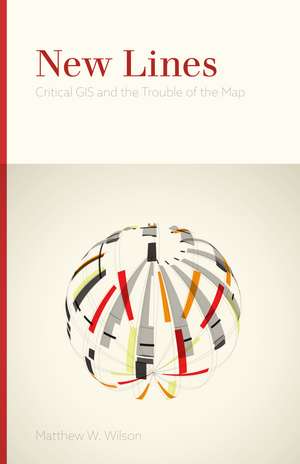New Lines: Critical GIS and the Trouble of the Map
Autor Matthew W. Wilsonen Limba Engleză Paperback – 15 noi 2017
New Lines takes the pulse of a society increasingly drawn to the power of the digital map, examining the conceptual and technical developments of the field of geographic information science as this work is refracted through a pervasive digital culture. Matthew W. Wilson draws together archival research on the birth of the digital map with a reconsideration of the critical turn in mapping and cartographic thought.
Seeking to bridge a foundational divide within the discipline of geography—between cultural and human geographers and practitioners of Geographic Information Systems (GIS)—Wilson suggests that GIS practitioners may operate within a critical vacuum and may not fully contend with their placement within broader networks, the politics of mapping, the rise of the digital humanities, the activist possibilities of appropriating GIS technologies, and more.
Employing the concept of the drawn and traced line, Wilson treads the theoretical terrain of Deleuze, Guattari, and Gunnar Olsson while grounding their thoughts with the hybrid impulse of the more-than-human thought of Donna Haraway. What results is a series of interventions—fractures in the lines directing everyday life—that provide the reader with an opportunity to consider the renewed urgency of forceful geographic representation. These five fractures are criticality, digitality, movement, attention, and quantification. New Lines examines their traces to find their potential and their necessity in the face of our frenetic digital life.
Seeking to bridge a foundational divide within the discipline of geography—between cultural and human geographers and practitioners of Geographic Information Systems (GIS)—Wilson suggests that GIS practitioners may operate within a critical vacuum and may not fully contend with their placement within broader networks, the politics of mapping, the rise of the digital humanities, the activist possibilities of appropriating GIS technologies, and more.
Employing the concept of the drawn and traced line, Wilson treads the theoretical terrain of Deleuze, Guattari, and Gunnar Olsson while grounding their thoughts with the hybrid impulse of the more-than-human thought of Donna Haraway. What results is a series of interventions—fractures in the lines directing everyday life—that provide the reader with an opportunity to consider the renewed urgency of forceful geographic representation. These five fractures are criticality, digitality, movement, attention, and quantification. New Lines examines their traces to find their potential and their necessity in the face of our frenetic digital life.
Preț: 184.84 lei
Nou
Puncte Express: 277
Preț estimativ în valută:
35.37€ • 36.49$ • 29.52£
35.37€ • 36.49$ • 29.52£
Carte disponibilă
Livrare economică 06-20 martie
Livrare express 19-25 februarie pentru 21.77 lei
Preluare comenzi: 021 569.72.76
Specificații
ISBN-13: 9780816698530
ISBN-10: 0816698538
Pagini: 224
Ilustrații: 23 black and white illustrations
Dimensiuni: 140 x 216 x 15 mm
Greutate: 0.29 kg
Ediția:1
Editura: University of Minnesota Press
Colecția Univ Of Minnesota Press
ISBN-10: 0816698538
Pagini: 224
Ilustrații: 23 black and white illustrations
Dimensiuni: 140 x 216 x 15 mm
Greutate: 0.29 kg
Ediția:1
Editura: University of Minnesota Press
Colecția Univ Of Minnesota Press
Notă biografică
Matthew W. Wilson is associate professor of geography at the University of Kentucky and visiting scholar in the Center for Geographic Analysis at Harvard University.
Cuprins
Contents
Preface
Introduction: But Do You Actually Do GIS?
1. Criticality: The Urgency of Drawing and Tracing
2. Digitality: Origins, or the Stories We Tell Ourselves
3. Movement: Strange Concepts and the Essentially Subjective
4. Attention: Memory Support and the Care of Community
5. Quantification: Counting on Location-Aware Futures
6. A Single Point Does Not Form a Line
Acknowledgments
Notes
Index
Preface
Introduction: But Do You Actually Do GIS?
1. Criticality: The Urgency of Drawing and Tracing
2. Digitality: Origins, or the Stories We Tell Ourselves
3. Movement: Strange Concepts and the Essentially Subjective
4. Attention: Memory Support and the Care of Community
5. Quantification: Counting on Location-Aware Futures
6. A Single Point Does Not Form a Line
Acknowledgments
Notes
Index
Recenzii
"With rapidly shifting digital technologies, geo-surveillance, everyday cartography, privatized georeferenced data, and neoliberalization, New Lines offers a reflexive reassessment of the scholarly praxis of critical GIS, an increasingly anachronistic term. Attentive also to contemporary philosophical debates, Matthew W. Wilson’s lively and ambitious manifesto pushes the reader to re-examine everything they thought they knew about the topic."—Eric Sheppard, author of Limits to Globalization: The Disruptive Geographies of Capitalist Development
"This elegantly argued book offers a brilliantly original perspective on the many ‘troubles’—technical, epistemological, cultural, and political—associated with the contemporary proliferation of digital mapping systems. For anyone interested in understanding the rapidly changing sociohistorical, technological and institutional contexts in which cartographic practice occurs, Matthew W. Wilson’s New Lines will provide a foundational source of insight, wisdom, inspiration, and provocation."—Neil Brenner, Harvard University
"This elegantly argued book offers a brilliantly original perspective on the many ‘troubles’—technical, epistemological, cultural, and political—associated with the contemporary proliferation of digital mapping systems. For anyone interested in understanding the rapidly changing sociohistorical, technological and institutional contexts in which cartographic practice occurs, Matthew W. Wilson’s New Lines will provide a foundational source of insight, wisdom, inspiration, and provocation."—Neil Brenner, Harvard University
"The book is an important provocation for any mapmaker, cartographer, and spatial thinker. Ultimately, the book is a required read – even if only for the history alone – for any map user."—Rhizomes
"New Lines reinvigorates some of the discussions that GIScience scholars have debated for decades by presenting material that is substantial without being impenetrable." —Cartographic Perspectives
"New Lines reinvigorates some of the discussions that GIScience scholars have debated for decades by presenting material that is substantial without being impenetrable." —Cartographic Perspectives
